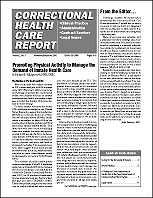Using Medicare to Help Cover the Cost of Geriatric Prison Health Care
Author: Margaret R. Moreland, JD, MSLS.
Source: Volume 17, Number 06, September/October 2016 , pp.85-86(2)

< previous article |next article > |return to table of contents
Abstract:
The number of U.S. state and federal prisoners 55 and older increased from under 9,000 in 1981 to almost 125,000 in 2010. By 2030, it is expected that at least a third will be classifi ed as “elderly.” Expenses will increase as well since it costs twice as much annually to incarcerate someone 50 or older. A major portion, of course, is related to healthcare. In a new study published in the Journal of Leadership, Accountability and Ethics, “Elderly Prisoners and Medicare,” Vivek Pande, James Gillespie, and Andrew Stapleton, professors at the University of Wisconsin-La Crosse, have examined the use of existing programs to shift some healthcare costs from state to federal entities—specifically, expanded Medicaid coverage under the Patient Protection and Affordable Care Act—and make a number of practice and policy recommendations making better use of available Medicare and Medicaid options intended to ensure better care for aging prisoners, both in prison and after release.Keywords: Medicaid; Patient Protection and Affordable Care Act; chronic conditions; substance abuse; serious mental health conditions; telemedicine
Affiliations:
1: Pace University School of Law.